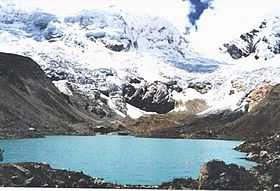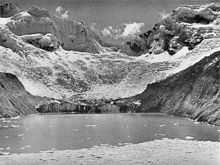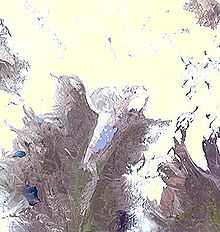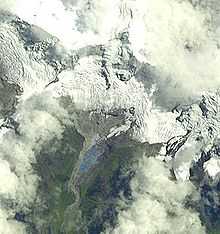Pallqaqucha
| Pallqaqucha | |
|---|---|
 2002 | |
| Location | Ancash Region |
| Coordinates | 9°23′49″S 77°22′47″W / 9.39694°S 77.37972°WCoordinates: 9°23′49″S 77°22′47″W / 9.39694°S 77.37972°W |
| Basin countries | Peru |
| Surface elevation | 4,566 m |
Pallqaqucha (Quechua pallqa, p'allqa, p'alqa forked, branched, fork, qucha lake,[1][2] hispanicized spelling Palcacocha) is a glacier lake in the Andes mountain range of South America in northwestern Peru located in the Ancash Region, Huaraz Province.
Location

Pallqaqucha is located at 9°23′49″S 77°22′47″W / 9.39694°S 77.37972°W in the Ancash Region in Cordillera Blanca at an elevation of 4,566 m, just below the summits of Pallqarahu (6,274 m) and Pukaranra (6,156 m). The lake is one of several lakes supplying the town Huaraz with water, 23 km to the southwest.


Flood Disaster 1941
On the early morning of 13 December 1941 a huge chunk of the adjacent glacier fell into Pallqaqucha causing the breaking of the moraine walls that limit the lake downhill. The wave hurtled down the Cojup valley, destroying another lake on its way Q'iraqucha (Jiracocha) and carrying blocks of ice, large rock boulders and liquid mud towards the Santa River valley. Within 15 minutes the mudslide reached Huaraz, with 400 m³ of debris burying parts of the town and killing approximately 6,000 to 7,000 inhabitants.
Disaster Warning 2003
In April 2003, NASA scientists discovered a fissure in the glacier above Pallqaqucha on Terra satellite images of November 2001. Their warnings reached Peru just two weeks after the staff of the UGRH (Unidad de Glaciologia y Recursos Hidricos) had done some field mapping of Pallqaqucha, where a moraine rupture had caused a minor flood from the lake on 19 March 2003 which the safety constructions from the 1940s had captured.
According to research done by scientists of the Innsbruck university in Austria, the ensuing panic among the inhabitants and economic damage to Huaraz' tourism industry could have been prevented, as from their findings the NASA warnings were a misinterpretation of satellite data.
As the glaciers in this part of the Cordillera Blanca as well as elsewhere have been declining and thinning up because of global climatic changes, there is no actual danger for Huaraz in the foreseeable future.
References
- ↑ Teofilo Laime Ajacopa, Diccionario Bilingüe Iskay simipi yuyayk'ancha, La Paz, 2007 (Quechua-Spanish dictionary): pallqa, P'ALLQA - adj. Bifurcado, ahorquillado. pallqa. - s. Bifurcación. Punto donde se separan dos o más vías o caminos. qucha, qhucha, quchacha. - s. Laguna. Lago pequeño. qucha, qhucha. - s. Lago. Gran masa de agua en una depresión.
- ↑ Diccionario Quechua - Español - Quechua, Academía Mayor de la Lengua Quechua, Gobierno Regional Cusco, Cusco 2005: p'alqa - s. Bifurcación, desvío, final en V. de una rama de árbol. EJEM: p'alqa k'aspi, rama de árbol que termina en V. SINÓN: tanka. Pe.Aya: pallja. Pe.Jun: palja. Ec: pallka.